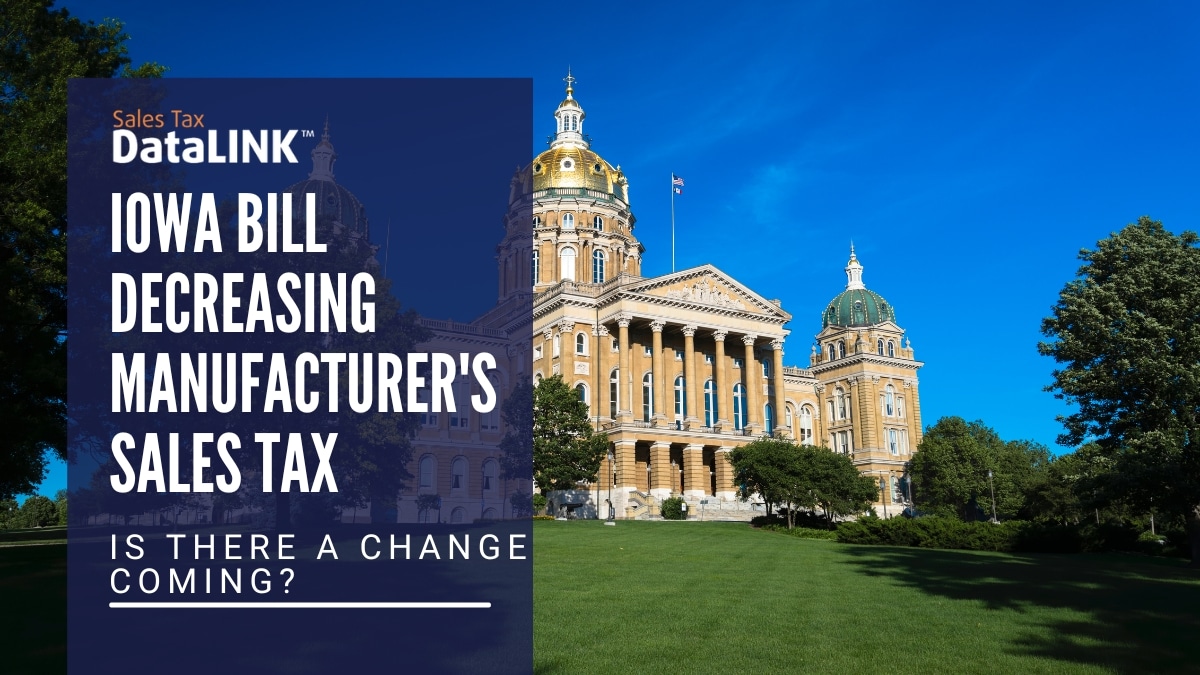Iowa Bill Decreasing Sales Tax For Manufacturers
Iowa’s Governor Terry Branstad signed House File 4233 into law on March 21 of this year. This major tax policy legislation adopts a scaled-back version of planned state sales tax breaks on some supplies used in manufacturing.
The change will reduce both state and local government tax collections by about $29 million, starting in the 2017 fiscal year, and increasing amounts in future years, and increase the number of items exempt from state sales tax to include certain supplies used in manufacturing, research and development, data processing or storage, and recycling activities. Previously, the exemption only included replacement parts, but House File 2433 amends that provision to also include supplies and materials used to construct or self-construct replacement parts and supplies.
The House approved the bill 79-18 and the Senate followed with a 50-0 vote, but government officials still have many growing conflicts with the bill.
Senate Republicans repeatedly criticize Senate Democrats, accusing them of hurting farmers and small business people. Matt Sinovic, the executive director of Progress Iowa, is recorded saying, “Now that the Legislature has taken care of big business, it’s time to get to work for our children, schools, and for access to health care.” However, many are unsatisfied with ignoring the need for educational funding in order to satisfy manufacturing businesses. The Department of Revenue predicts that the new bill will cost Iowa an estimated $29 million annually, which could easily impact pre-kindergarten through 12th-grade education programs.
Rep. Cindy Winckler states, “I cannot in good conscience support a bill that further limits our ability to fund public education”, and she is not alone.
Thanks to the overwhelming concern for the loss of government program funding, the Department of Revenue agreed to delay the bill’s date of effect from January 1 to July 1. Could this extra time allow opponents to possibly pass a bill nullifying the change?
Sen. Randy Feenstra initially proposed an amendment on the Senate floor intending to make the effects of House File 2433 permanent, but he withdrew it once Senate Democrats threatened to block the bill in its entirety. Instead, House File 2433 passed with a compromised agreement on the amount of coupling and manufacturing sales tax exemptions.
“This discussion is not about the amount of revenue we need,” said Rep. Gary Worthan, “This is about a fair tax policy. Those two discussions don’t belong in the same room at the same time. … After we’ve established a fair tax policy, then we look at the revenue side and determine what the rates need to be.”
So now, instead of Iowa allowing a proxy Value-Added Tax which requires the payment of sales tax on unfinished items, only consumable items are to be taxed. Senate Republicans will push next year to make the changes permanent at the state level, according to Sen. Randy Feenstra, and this may reopen the delicate controversy surrounding the bill.
We expect House File 2433 to remain intact, but if tensions concerning funding continue to rise then we may see the reinstation of previously “non-consumable items” as a taxable source. There is simply no way to concretely predict the outcome of this controversy, but you can still be prepared with sales tax software that constantly re-updates tax rates as they change so you don’t have to.
Rest assured; Sales Tax DataLINK is continuously following this story and many others to remain up-to-date in a dynamic, complex tax system. If you want to know more, visit us at http://www.salestaxdatalink.com/ to see similar articles, or call us at 877-806-7715 to hear more about our software.




